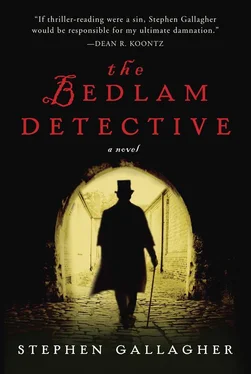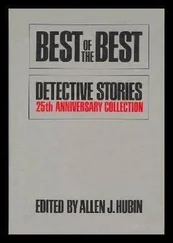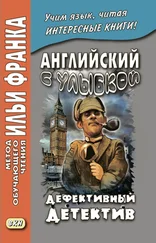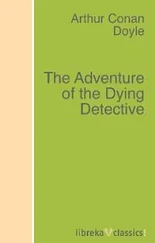Stephen Gallagher - The Bedlam Detective
Здесь есть возможность читать онлайн «Stephen Gallagher - The Bedlam Detective» весь текст электронной книги совершенно бесплатно (целиком полную версию без сокращений). В некоторых случаях можно слушать аудио, скачать через торрент в формате fb2 и присутствует краткое содержание. Жанр: Исторический детектив, на английском языке. Описание произведения, (предисловие) а так же отзывы посетителей доступны на портале библиотеки ЛибКат.
- Название:The Bedlam Detective
- Автор:
- Жанр:
- Год:неизвестен
- ISBN:нет данных
- Рейтинг книги:5 / 5. Голосов: 1
-
Избранное:Добавить в избранное
- Отзывы:
-
Ваша оценка:
- 100
- 1
- 2
- 3
- 4
- 5
The Bedlam Detective: краткое содержание, описание и аннотация
Предлагаем к чтению аннотацию, описание, краткое содержание или предисловие (зависит от того, что написал сам автор книги «The Bedlam Detective»). Если вы не нашли необходимую информацию о книге — напишите в комментариях, мы постараемся отыскать её.
The Bedlam Detective — читать онлайн бесплатно полную книгу (весь текст) целиком
Ниже представлен текст книги, разбитый по страницам. Система сохранения места последней прочитанной страницы, позволяет с удобством читать онлайн бесплатно книгу «The Bedlam Detective», без необходимости каждый раз заново искать на чём Вы остановились. Поставьте закладку, и сможете в любой момент перейти на страницу, на которой закончили чтение.
Интервал:
Закладка:
The change in the water was sudden and brutal. One moment a fast, rough ride; the next, a merciless battering. Within seconds we’d lost our paddles and unsecured cargo and were clinging on for our lives, as our boat tossed and skipped down a thunderous chicane of white water and spray. Swept around the next bend, we came upon the first wreckage; one of our steel-hulled boats had lifted right up out of the water like a leaping fish, turned onto its side, and jammed itself between rocks, and now there was no sign of the men who’d been emptied from it. As we sped by I saw a wooden chest from its load caught in a whirlpool, spinning in place. I’d barely had a chance to take that in when our own boat grounded hard and bounced on a great shelf of stone, and only my grip on the side kept me from being flipped overboard.
We lost a man from our boat. I was too busy clinging on, and never saw him go. After a while, we reached quieter waters and were carried along, out of danger but with no control. We bailed out the boat with our hands and prayed that those from the wreck had survived, and that the others had fared better than we. A few hundred yards farther on, our prayers received their grim answer.
Boats, bodies, debris … I can hardly exaggerate the horror. We coasted through them in appalled silence. For all who’d fetched up here, more must have been swept on downstream.
Farther on, the river widened and slowed. To our left rose the sheer curving side of the gorge; it held the river in a wide loop, with a low-lying beach contained within the loop like a tranquil island. On this sandbank I saw our astronomer, waving a flag made from a shirt, and with nothing but our hands for oars we dug into the water and propelled ourselves toward him.
Five out of our twenty boats had survived intact. Forty souls, including all in the lightly laden pilot boat, remained alive. The rest-gone. It was a true disaster. Over the next day or so we saw many of our fellows being carried by, bloated and floating high in the tepid waters and with a cloud of flies over each. Some of the cargo drifted by as well, and we rescued whatever we were able to catch. I found the medical kit, and in my capacity as “expedition doctor” did what I could to treat the minor injuries of the survivors.
Any drowned Europeans that we saw, we dragged in for burial. I regret to say that the Indians and camaradas were pushed out into the middle of the river and sent on their way. The surviving camaradas were grimly accepting of this practice, as they were the ones assigned to the digging. While searching for a suitable graveyard site within reach of the river bend, our burial party found a row of overgrown mounds with wooden grave markers. The wood was rotten, the markings illegible. Those graves could have been made ten years before, or a hundred.
I found this deeply disturbing. It meant that others had been this way before us, and had suffered a similar trial. But no record of any prior exploration of the river had been found. Which suggested to me that those who’d survived this hazard, and made these graves for their comrades, must ultimately have fallen to some other hazard yet to come.
I suggested as much to Sir Owain.
“Good God, man,” was his response. “Don’t breathe a word of that to the others. As if this weren’t trial enough. I can’t believe you’re out to make it worse.”
His wife and son were in a tent some way from the beach, where they would not be forced to witness the sad spectacle of the passing dead. But I saw the boy standing by the tent and staring at the waters anyway, while his mother lay prostrate inside. All the symbols of civilization-a picnic hamper, wine bottles, cruet sets, parasols, trunks with changes of clothes-passed before his gaze and were carried away, as if offered in sacrifice for the use of the drowned in the afterlife.
That evening, I overheard Sir Owain speaking to his wife and son. I did not deliberately eavesdrop. Voices carry through canvas, and it was impossible not to hear.
I heard him say, “We’ve suffered a setback, I won’t deny it. I cannot promise you all of the comforts I’d intended to provide. But I swear to you. Our safety is not compromised and our purpose has not changed.”
Mrs. Lancaster said something in return, and I could not hear what.
The next morning I looked out across the river and saw the head of that rocking horse floating by, upright and bobbing like a seahorse, badly battered and with its body mostly submerged in the water. In the same moment I saw that Lancaster’s boy was in the river up to his knees, trying to reach it.
I called out, “Are you mad, boy? What do you think you’re doing?” and I waded into the water and dragged him back to the shore. Though the river was slower here, it was far from safe. There were undercurrents, and there were parasites. The rocking horse was already gone.
Later that day, Sir Owain sought me out.
He said, “Simon has demanded that I dismiss you.”
I thought at first that he was making some wry comment and that thanks would follow. But then I saw that he was serious.
I said, “I beg your pardon?”
“Please,” he said. “If my son is ever to be disciplined, I’d prefer you don’t interfere.”
“I didn’t discipline him,” I said. “I pulled him from the water before he took the step that would see him drowned or carried away. If you want him to learn anything from this misconceived adventure, show him how to look after himself or teach him some gratitude.”
I cannot tell you Sir Owain’s reaction, as at that point I turned my back on him and walked away.
With our five boats, our mixed party of survivors, and our salvaged equipment, we continued down the river. In shallow water near the next night’s camp, Sir Owain spied one of his instrument cases and, seeming to forget all tragedy, exulted in the possibility that he might still achieve something of the scientific purpose of the expedition.
But when the case was recovered, everything inside proved to be smashed or damaged in some way.
“Ruined,” I heard him say. “All ruined.”
That night some animal moved through the jungle close to our camp, smashing and breaking trees. We reached for our remaining guns and leapt to our feet. But as much as we did not want to leave the light of our campfire, the intruder did not wish to approach it and we were spared a confrontation.
The next morning we contemplated its wide trail, and two of the camaradas set out to follow it. Sir Owain called me over and asked for my thoughts.
I said, “There’s no single animal of such a size. Not in this jungle. Unless the rumors are true and the Megatherium survives.”
“Megatherium?” he said. “Never heard of it. Is it a dinosaur?”
“No,” I said. “It’s one of the largest mammals ever known. Believed to have been extinct for over five thousand years, but some say that the Amazon basin is vast enough and wild enough for some areas of its ancient habitat to survive unchanged.”
“Herbivore or carnivore?”
“Herbivore,” I said. “The Megatherium’s stance was like a bear’s, but it was the size and weight of a bull elephant.”
He nodded, and kicked thoughtfully at the trampled ground, and then looked at all the stalks and branches that the creature had broken in passing.
“That could have done it, all right,” he said.
“Could have,” I said. “If one even exists.”
“What do you think, Somerville? What if a man could bag such a beast and drag it home?”
He was serious. I thought for a moment that he was speaking hypothetically, but he was not.
I said, “Owain. Look at what’s been lost. Forget about your standing and your reputation for once. We’ll be lucky if we all survive.”
Читать дальшеИнтервал:
Закладка:
Похожие книги на «The Bedlam Detective»
Представляем Вашему вниманию похожие книги на «The Bedlam Detective» списком для выбора. Мы отобрали схожую по названию и смыслу литературу в надежде предоставить читателям больше вариантов отыскать новые, интересные, ещё непрочитанные произведения.
Обсуждение, отзывы о книге «The Bedlam Detective» и просто собственные мнения читателей. Оставьте ваши комментарии, напишите, что Вы думаете о произведении, его смысле или главных героях. Укажите что конкретно понравилось, а что нет, и почему Вы так считаете.












